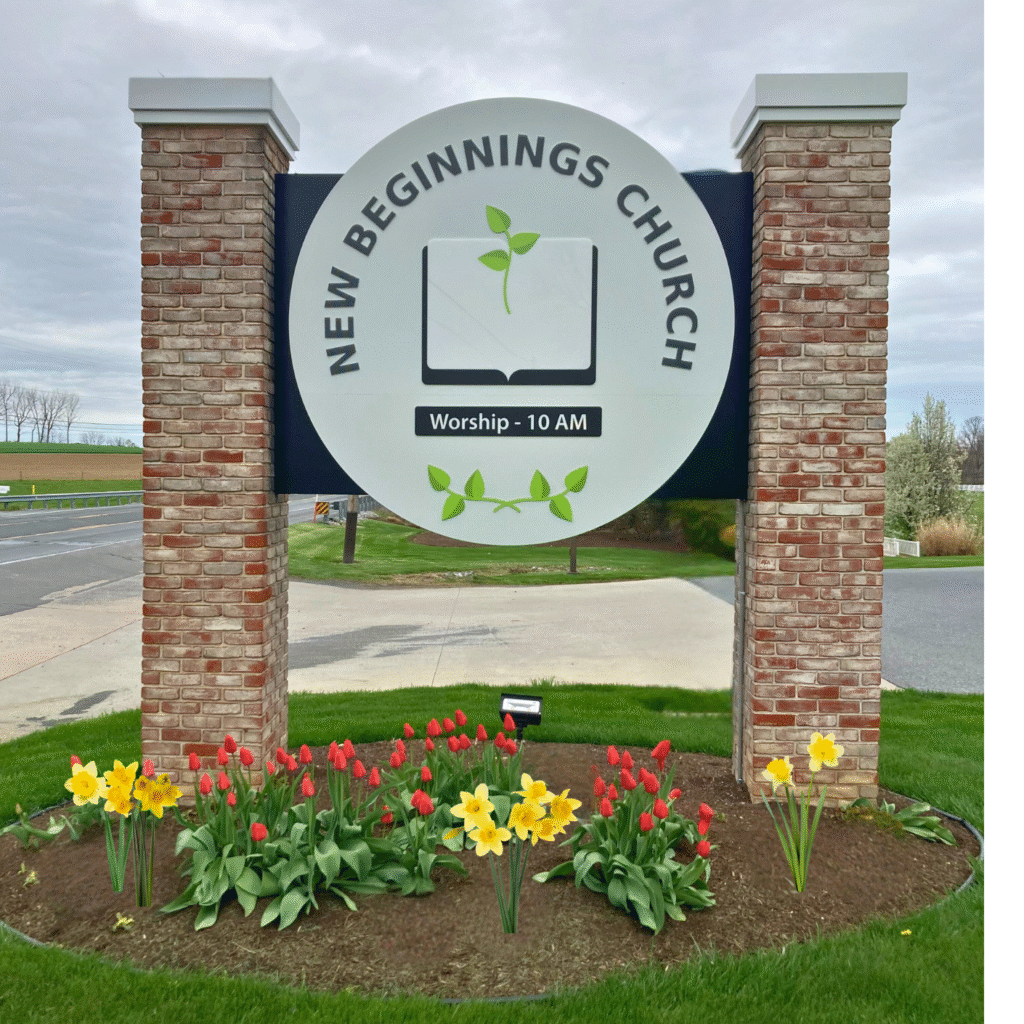About New Beginnings Church
Who We Are
Located in the heart of Myerstown, PA, New Beginnings Church is dedicated to teaching the infallible Word of God, spreading the message of Jesus Christ, and providing a welcoming environment for believers to grow in their love for God and one another. As part of the Charis Fellowship church planting network, New Beginnings is committed to multiplying the church, training godly leaders, and representing Jesus in the world through the proclamation of the Good News and the practice of good works.
We welcome worshippers of ages and backgrounds to join us for our Adult Bible Fellowship, Sunday worship services, and various ministry programs.
Come and Worship With Us
Sundays: 9:00-9:45 AM
Acts 2:42 Ministry (Sunday School) and Charis Kids
Sundays: 10:00-11:15 AM
Worship Service
Meet Our Team
Church Staff

Pastor Joe Ensley
Teaching & Counseling Pastor
717-866-5704

Susan Myer
Secretary
717-269-2966

Ethan Derliunas
Ministry Operations Coordinator/Kid's Ministry
717-602-1577

Victor Witman
Custodian
610-589-2953

Shawn Kreiser
Executive Officer
717-821-0724
Elders

Pastor Joe Ensley
717-866-5704

Carl Brubaker
IT/Media Administration
717-679-1756

Rex Kidder
Awana Commander & Building Security Admin
717-644-4896

Barry Fornwalt
717-389-2376
Stewards

Lowell Wirt
717-454-7249

Shawn Kreiser
717-821-0724

Susan Myer
717-269-2966
Raise Up

Jim Mingle
Align Life Liaison
410-596-0038

Daryl Baker
Men's Ministry Director
717-277-1033

Patrick and Shawn Kreiser
Acts 2:42 Ministry Directors
717-821-0724

Christine Brubaker
Women's Ministry Coordinator
717-673-9156
Refine

Allie Derliunas
Conviviality Coordinator
Sunday Refreshments & Home Meals
(717) 228-7278

Maria Fisher
Welcome Center Coordinator
717-222-9662

Marj Purdy
Website Coordinator

Brenda Crouse
Vision Team

Miriam David
Vision Team

Lowell Wirt
Vision Team

Rochelle Pontz
Vision Team

Ben Cross
Building Maintenance Coordinator
717-454-6968

Crystal Miller
Volunteer Clearance Administrator
717-679-5451

Grant David
Vision Team

Kurt Bogart
Grounds Maintenance Coordinator
Mission, Vision & Beliefs
Mission Statement
Reach Out
The primary focus of our church is to follow the Great Commission by Reaching out to our community with the Gospel. This means that we want to specifically reach people with the Good News that Christ died for sinners. All of our outreach activities include some form of the Gospel message, so that we don’t just “do good” for our neighbors physically, but also reach them for eternity.
Raise Up
Making disciples was important to Jesus, and it is important to us! That’s why our internal church programs and ministries are geared to Raise up faithful followers of Jesus. It’s easy to “believe in God” in your head, but following Jesus takes sacrifice, training, and a group of other followers to grow with in a community.
Refine
God is the same yesterday, today and forever, but His people’s times, cultures, and communication venues change regularly. With that in mind, we want people to know upfront that we embrace change by prayerfully Refining every ministry as the Spirit leads.
Value Statement
We value healthy communication
Ephesians 4:29 & Colossians 4:6
We value encouragement and equipping saints for ministry
Hebrews 10:25 & Ephesians 4:12
We value biblical process
1 Corinthians 14:30 & Matthew 18
we value committed grace in relationships
Romans 12:8, Galatians 6 & Hebrews 12:15
Vision Statement: Who we are growing to be
Who we are growing to be:
Statement of Faith
We of the Charis Fellowship of Churches, in harmony with our historic position, believing the Bible, the whole Bible, and nothing but the Bible to be our infallible rule of faith and of practice, and feeling our responsibility to make known the divine message of the Bible, present the following articles as a statement of those basic truths taught in the Bible which are common to our Christian faith and practice:
The Word of God, the sixty-six Books of the Old and New Testaments, verbally inspired in all parts, and therefore wholly without error as originally given of God (II Timothy 3:16; II Peter 1:21).
Existing eternally as three persons – the Father, the Son, and the Holy Spirit (Luke 3:22; Matthew 28:19; II Corinthians 13:14).
His pre-existence and deity (John 1:1-3), incarnation by virgin birth (John 1:14; Matthew 1:18-23), sinless life (Hebrews 4:15), substitutionary death (II Corinthians 5:21), bodily resurrection (Luke 24:36-43), ascension in to heaven and present ministry (Hebrews 4:14-16), and coming again (Acts 1:11).
His personality (John 16:7-15); and deity (Acts 5:3-4); and His work in each believer: baptism and indwelling at the moment of regeneration (1 Corinthians 12:13; Romans 8:9); and filling (Ephesians 3:16; Acts 1:8; Galatians 5:22-23).
His direct creation in the image of God (Genesis 1:26-28), his subsequent fall into sin resulting in spiritual death (Genesis 3:1-24; Romans 5:12), and the necessity of the new birth for his salvation (John 3:3-5).
A complete and eternal salvation by God’s grace alone, received as the gift of God through personal faith in the Lord Jesus Christ and His finished work (Ephesians 2:8-9; Titus 3:5-7; I Peter 1:18-19).
One true Church, the body and bride of Christ (Ephesians 1:22-23; 5:25-32), composed of all true believers of the present age (I Corinthians 12:12-13); and the organization of its members in local churches for worship, for edification of believers, and for worldwide gospel witness, each local church being autonomous but cooperating in fellowship and work (Ephesians 4:11-16).
A life of righteousness, good works, and separation unto God from evil ways of the world (Romans 12:1-2), manifested by speaking the truth (James 5:12), maintaining the sanctity of the home (Ephesians 5:22-6:4), settling differences between Christians in accordance with the Word of God (I Corinthians 6:1-8), not engaging in carnal strife but showing a Christ-like attitude toward all men (Romans 12:17-21), exhibiting the fruit of the Spirit (Galatians 5:22-23), and maintaining a life of prayer (Ephesians 6:18; Philippians 4:6), and including the privilege, when sick, of calling for the elders of the church to pray and to anoint with oil in the name of the Lord (James 5:13-18).
The Christian should observe the ordinances of our Lord Jesus Christ, which are:
- Baptism of believers by triune immersion (Matthew 28:19).
- The threefold communion service, consisting of washing of the saints’ feet (John 13:1-17), the Lord’s Supper (I Corinthians 11:20-22, 33-34; Jude 12), and the communion of the bread and the cup (1 Corinthians 11:23-26).
Learn More: “What your pastor DIDN’T tell you about Baptism | Triune Immersion and church history“
His existence and personality as the great adversary of God and His people (Revelation 12:1-10), his judgment (John 12:31), and final doom (Revelation 20:10).
The personal, visible, and imminent return of Christ to remove His Church from the earth (I Thessalonians 4:16-17) before the tribulation (I Thessalonians 1:10; Revelation 3:10), and afterward to descend with the Church to establish His millennial kingdom upon the earth (Revelation 19:11-20:6).
The conscious existence of the dead (Philippians 1:21-23; Luke 16:19-31), the resurrection of the body (John 5:28-29), the judgment and reward of believers (Romans 14:10-12; II Corinthians 5:10), the judgment and condemnation of unbelievers (Revelation 20:11-15), the eternal life of the saved (John 3:16), and the eternal punishment of the lost (Matthew 25:46; Revelation 20:15).
What is the Gospel?
...and where does New Beginnings fit in?
“Gospel” is a much used but often misunderstood word. The word itself means “good news”, and in the Bible refers to the good news of salvation through Jesus Christ. In a sense, the whole Bible is “The Gospel”. In another sense, the whole Bible is also “The Law”, which shows people their own sin and need for personal salvation that only comes through The Gospel.
First Corinthians 15:1-11 is a core Bible passage describing The Gospel. It is certainly not the only passage, nor is the concept of The Gospel limited to what we find there, but it is a passage that is vital to our understanding of The Gospel. Let’s make seven basic observations about The Gospel from this passage.
1. The Gospel is a plan of God established from eternity. It is “according to the Scriptures” (v.3-4). It is a true, objective message from God.
2. The Gospel is anchored in actual, true, verifiable, historical events which are essential to God’s plan of redemption (#1). Christ “died”, “was buried”, “was raised on the third day”, and “appeared to more than five hundred brethren at one time” (v.3-8). These are the central events of The Gospel, while all other events and characteristics of the life and being of Jesus Christ are also The Gospel.
3. The Gospel is an accomplishment that took place through these central events (#2). Christ’s death was “for our sins” (v.3). Something vital was transacted between God The Father and God The Son at The Cross, specifically that The Father accepted The Son’s death as a satisfactory, substitutionary payment in full for penalty of sin (see Romans 3:25-26). Christ’s resurrection demonstrates the truth and power of that transaction, providing the offer of justification from our sins by the living Christ ( see Romans 4:25 . . . Christ “was delivered over because of our transgressions, and was raised because of our justification”).
4. The Gospel is an offer that is free, because the work has already been accomplished (#3) and the full price has already been paid by the blood of Jesus Christ. The Gospel can only be “received” (v.1), not earned, deserved, or merited. Those who humbly receive this Gospel as a gift (Ephesians 2:8-9), are “justified as a gift by His grace through the redemption which is in Christ Jesus” (Romans 3:24).
5. The Gospel is an application of itself by God’s grace to sinners in need (v.9-10). God The Holy Spirit enacts this saving grace within the one who will receive it (John 3:8, Titus 3:5), causing this one to have an interest in The Gospel and faith to believe it (Ephesians 2:8-9, First Peter 1:21).
6. The Gospel is the power of God for salvation (v.1,10; see also Romans 1:16). When the Word of God is activated within a person by The Spirit of God, faith is created (Romans 10:17).
7. The Gospel is the provision of unlimited benefits to those who truly receive it (v.1,10-11). Among these are pardon, forgiveness, justification, status as a child of God, the indwelling of the Spirit of God, assurance, repentance, power over sin and Satan, identity in the family of God, ability to understand the Word of God, opportunity to serve, the ability to love, the help of the Spirit in relationships, purpose and direction for living, the glorification of the body, and the guarantee of heaven. All of this and infinitely more can be summarized under the heading “Eternal Life” which is the present possession of the believer (John 6:47). The essence of Eternal Life is knowing (experiencing, enjoying) God personally through Jesus Christ (John 17:3, First Peter 3:18).
Do we have Good News for you?
Yes, really Good News!
God has an eternal, true, objective plan that He has established for you. He has made this plan known through the Bible, especially in the words and events of Jesus Christ. The most verifiable and central of these events are the life, death, burial, resurrection, and post-resurrection appearances of Jesus Christ. Through the death and resurrection of Jesus, God The Father has provided for the full, satisfactory pardon and forgiveness of your sins. Because He has done this, the offer of salvation to you is absolutely free. If you are interested in this offer, that is God The Holy Spirit at work in you bringing you to faith and salvation. When you believe the Gospel, trusting in the true Person and Work of Jesus Christ to save you, that is the power of God in your life. Infinite, unlimited, eternal, permanent spiritual benefits become yours the instant you believe. Yes, this includes going to Heaven someday. But it begins with enjoying Eternal Life today, knowing God personally and walking with Him.
Our Doctrinal Distinctives
We have been created and redeemed by God for His own glory (Isaiah 43:7, First Corinthians 6:20). Our chief desire is to know, love, and obey Him, thus promoting His glory in every circumstance, everywhere, among all peoples (Matthew 22:37-40, Matthew 28:18-20). We desire to be intensely God-focused, even to the extent of pleasing God rather than people when the choice arises (First Thessalonians 2:4).
The one, true God has never been nor ever will be less or more than triune (Second Corinthians 13:14). The God-given illustration of this truth for this age is the water baptism of disciples of Jesus — one baptism consisting of three coequal actions (Matthew 28:19). It is the Second Person, The Lord Jesus Christ, Who is represented by the second — the central — baptismal action. It is Christ who brings us to the Father (First Peter 3:18), and it is the role of the Holy Spirit to glorify Christ (John 16:13). Christ is central. As His church we long to know Him, love Him, obey Him, praise Him, and serve Him. We worship Him as the honored center of the Scriptures and every portion of our lives, that “in all things He must have the preeminence (Colossians 1:18).
The preacher is to preach the Word with both exegetical accuracy and spiritual power (Second Timothy 4:1-2, First Thessalonians 1:5). The pulpit ministry is central in the church’s worship, knowledge, holiness, love, devotion, and mission. Therefore, it is indispensable and must not be diminished or replaced.
Flowing both to and from Expository Bible Preaching is Sound Doctrine. Sound Doctrine consists not only of accurate, cognitive biblical facts, but also the understanding of those facts which brings life-application, spiritual integrity, and obedience. In a time when many people do not accept or tolerate sound doctrine (Second Timothy 4:3-4), the elders of the church yet are responsible to guard the flock from compromising and dangerous influences (Acts 20:28-32). The Statement of Faith of the Charis Fellowship of Churches is the tool (not creed) we use to explain some of the vital doctrinal parameters.
We accept “The Bible, The Whole Bible, and Nothing But the Bible” as our authority. We do not accept the authority of creeds or other man-made formulations. In our worship, we do not recite creeds, nor sing them, nor read them. We do stand in honor of the reading of the Word of God (Nehemiah 8:5). It is our desire to be thoroughly biblical in the totality of our lives. Our purpose, methods, and goals must be from sound, biblical teaching. We reject the concept that biblical goals can be achieved by man-centered, man-empowered methods.
We affirm that the first eleven chapters of Genesis are actual, true history, and are to be believed and taught as such (as should all of Genesis and all historical portions of the Bible). The days of Creation Week are actual, real, 24-hour days revealed in Genesis as comprising a genuine historical time-block with no intervening gaps in the text or in history. Adam and Eve were real humans, the first two ever, not merely literary symbols of human existence nor vestiges of some pre-Adamic race of beings. The record of the Fall of Man and the events leading to the global catastrophic Flood are real, and the worldwide Flood is factually true history. This understanding is essential to a Biblical Worldview which accurately includes the establishment and outworking of the nation of Israel from the beginning through to the prophesied culmination of all things in the destruction of the present heavens and earth, and the establishment of the New Heaven and New Earth. Without this understanding of Genesis there is no possibility of interpreting the rest of the Bible in a way that sees its statements as true and accurate, including anyone’s personal salvation.
The direction of corporate worship is vertical, an engaging of God and the congregation. Worship involves ascribing honor, majesty and praise to Christ (Revelation 5:12-14) and learning from Him (Luke 10:38-42). The most significant feature, then, of corporate worship is the public reading of and expository preaching of the Word of God. All other features of corporate worship – the offering, announcements, music, drama, audio and visual, prayers, etc. – must seek to fulfill this vertical direction. The music department strives to lead the church family to glorify God and to edify one another through singing and musical instruments, ministering with spiritual passion and doctrinal integrity, while seeing God-honoring standards of musical excellence. Music is to reinforce sound Bible doctrine through song, and to express congregational praise and adoration to Christ Who is our Audience.
New Beginnings Music Team Worship Leadership Policy
Purpose:
To create an environment where the worship team aligns with biblical teachings on authority and submission, following the structure in 1 Corinthians 11.
Policy Guidelines:
1. Authority Structure:
Recognize the established order of authority: God is the head of Christ, Christ is the head of man, and man is the head of woman. This order should be reflected respectfully in worship leadership. The Elders provide the oversight of the Music team, but it is more closely managed by a designated spirit-filled and qualified male leader.
2. Role of Women in Worship Leadership:
Women are encouraged to participate in helping with worship, provided they do so with an attitude of submission to the designated male leadership within the church. Women may lead the congregation in worship songs under the guidance and covering of
the male church leadership team.
3. Symbolism and Heart Posture:
The “covering” mentioned in 1 Corinthians 11 is a demonstration of submission to authority. Female team members are not required to wear physical coverings (such as headscarves) but should exhibit a heart posture of respect and submission to the leadership structure.
4. Submission as a Prerequisite for Leadership:
Any member, male or female, must demonstrate a heart submitted to Christ and to their earthly authorities to lead worship. Women, when leading, should do so with the understanding that their leadership respects the biblical framework of gender roles. If no male leader is present, women leaders are
encouraged to consider wearing a type of head-covering as a reflection of their submission to biblical gender roles within the church.
5. Encouragement of Spiritual Growth and Accountability:
Male leaders are encouraged to maintain a spirit of humility and Christ-like leadership, ensuring a respectful and supportive environment for all team members. Accountability structures should be in place to help all leaders, male and female, remain
faithful to the teachings of Christ and the established authority order.
Conclusion:
This policy encourages a collaborative and respectful worship environment, where all members understand and honor biblical principles of authority and submission as they lead the congregation in worship (1 Corinthians 11).
While we fully believe that salvation is the work of God in His sovereign grace (Psalm 3:8, Ephesians 2:8, Romans 9:15-16), we are also obediently committed to preach the Gospel to everyone, imploring people to believe and be reconciled to God (Mark 16:15, Second Corinthians 5:20). Such, too, is the sovereign work of God. And, while we believe that God calls some to the office of Evangelist, He does so to equip every believer to evangelize the lost (Ephesians 4:11-12). We understand that regeneration and saving faith cannot be produced by manipulation, coercion, or programming; rather they are the result of the supernatural work of the Holy Spirit (John 3:5-8, Titus 3:5). We believe the Holy Spirit does His supernatural work of regeneration through the preaching of the Gospel according to the Scriptures, not apart from it (Romans 1:16, First Corinthians 15:1-5, First Peter 1:23).
“Total depravity” or “total inability” are doctrinal phrases which describe the lostness of all people who are not yet regenerated in Christ. This is not to suggest that, relatively speaking, all people are “as bad as they can be”, but rather that all people are “as bad off as they can be.” There is “none righteous” (Romans 3:9), “none who understands”, “none who seeks for God” (Romans 3:10), and none who has any ability to please God (Romans 8:8). Without spiritual birth from above, man “cannot” – has no ability to – “see the kingdom of God” (John 3:3).
Regeneration is completely the sovereign work of God, and in no way is caused by or assisted by any work or decision of man (John 1:12-13, John 3:8, Titus 3:5). The gift of God in this new birth is a new heart (core identity) which truly desires to please God (Romans 2:29, 7:22). The first, necessary, and evidential act of the new birth is the exercise of the gift of faith (Ephesians 2:8, John 3:16), which is to the new birth what breathing, eating, and drinking are (John 6:53-54). Saving faith/trust involves the elements of knowledge (notitia – mental element/understanding – the perception of truth and its qualities), assent (assensus – emotional element/inclination – the persuasion of truth as the object of Faith), and confidence (fiducia – volitional element/will – personal reliance on the Person of Christ). To have the mental or emotional elements only does not constitute saving faith, for even demons believe in that sense (James 2:19). By the exercise of faith alone, the believer receives justification (Romans 3:28, 4:5), forgiveness of all sin (Colossians 2:13-14), right-standing with God (Romans 5:1-2), all the spiritual blessings of heaven in Christ (Ephesians 1:3), and new identity as a believer in Christ (Second Corinthians 5:16-17).
Matthew 18 was the most quoted chapter of the Bible among the old Brethren. It is not the only biblical passage or approach to church discipline, but it is historically the most well-known. We acknowledge the necessity of carrying out appropriate disciplinary processes for the spiritual health, holiness, and preservation of the local body (Matthew 18:15-22, First Corinthians 5:3-13, Romans 16:17-18). This must be done with grace, love, and sensitivity (Ephesians 4:15), with the goal of forgiveness and restoration (Galatians 6:1).
We acknowledge the duty of the true church to separate herself from worldliness, apostasy, and error (Romans 16:17-18, Second Corinthians 6:14 – 7:1, First John 2:15-17). This includes separation from all manner of sin, including that which is “religious”, “ecclesiastical”, or “philosophical” – for example, non-Christian religions (like Islam, Hinduism, Buddhism, etc.), “Christian” cults (like Mormonism, Jehovah’s Witnesses, Seventh Day Adventists, Christian Science, liberal Protestantism, Roman Catholicism, etc.), neo-pagan philosophies (like the New Age movement, “emergent church” theologies, theistic evolution, the Masonic Lodge), and so on. This separation is not isolation, but the recognition that such people are to be evangelized, not counted as co-workers in a cause with which we cooperate. In love and compassion we bring the Gospel to them.
The church has a body of elders/pastors who teach and shepherd the flock. In accordance with Hebrews 13:17, they keep watch over the congregation as men who must give an account to God. According to the same text, the congregation is to obey them and submit to their authority so that their work will be a joy and not a burden. The elders must meet the qualifications set forth in I Timothy 3:1-7, which includes male-only eldership., They exercise authority over the church only to the degree that they teach and lead according to the Scriptures, and do so with grace and humility (First Peter 5:1-5).
According to Jesus the life of every believer should be marked by service (Mark 9:35). There are specific servant-leaders marked out by the New Testament to be leaders among servants. These are deacons/deaconesses and stewards/stewardesses. These must have lives consistent with the listed biblical qualifications (First Timothy 3:8-13, First Corinthians 4:1-2). Their tasks include the carrying out of ministries and projects (Acts 6:1-7) of many kinds, and often have the primary responsibility of meeting the physical, financial, and material needs of the congregation, both individually and corporately. When these lead and serve well, they obtain great honor in Christ (First Timothy 3:13).
We believe that meaningful and enduring fellowship in a local congregation is absolutely essential to the Christian’s life and ministry. Media “ministries” can never take the place of the local church. We are committed not only to congregate, but to do so for the purpose of encouraging one another and stimulating one another to love and good deeds (Hebrews 10:24-25). A church is an autonomous local congregation of true believers under the headship of Jesus Christ. Church government is from the congregation itself, raising up elders, deacons, and stewards. While local churches help each other and cooperate in an interdependent manner (Romans 16:16), no church or outside entity has authority over any other church.
The purpose of the people of New Beginnings is . . . to discover and develop people who will become biblically obedient, passionate followers of Jesus Christ in devoted relationship with us. We offer systematic, biblical programs and tools of discipleship for people of all ages. We affirm that parents are primarily responsible for the discipleship and discipline of their children (Ephesians 6:1-4). The church should not usurp the authority of godly parents, nor assume the responsibilities of parents who are lax in their duties. The church should give itself to teaching the biblical principles of parenthood and to holding parents accountable to carry them out in the context of families. While we have an active program for children and youth, it should be viewed as an extension of the parents’ roles, and it is never to replace them.
We affirm that the marriage relationship of one man and one woman for life is the design and plan of God (Genesis 2:23-25). Sex within marriage is holy (Hebrews 13:4). All sexual activity outside of a biblically defined marriage is sin (fornication, adultery, “living together”, homosexuality, pornography, lust, incest, and so on). We also affirm that believers are not to be unequally yoked in binding relationships with non-believers (Second Corinthians 6:14), and that this includes marriage as well as other kinds of binding relationships. We further affirm that God hates divorce (Malachi 2:14-16), which was never part of God’s recommended plan in Creation (Matthew 19:8). And, of course, we affirm the power of the Gospel to justify and sanctify true believers, no matter what their wicked past may have been.
We affirm that God’s covenants with Abraham (Genesis 12;1-3, 15:18-21, 17:1-7) and David (Second Samuel 7:12-17) are unconditional and will be fulfilled as promised through Jesus the Messiah at His Second Coming and the establishment of His Kingdom. This includes the land promises as well as Messiah as the Son of David ruling on David’s throne on earth in the Kingdom. God has a future program for Israel, and she will be “grafted in” again to God’s covenantal promises (Romans 11:23-29). This perspective includes the actual future fulfillment of sections of Scripture like Ezekiel 36-48. The Body of Christ has the scriptural, ethical responsibility to support Israel and seek her peace and salvation. We repudiate the errors of “replacement theology” (Israel being “replaced” permanently from her promised blessings, and “Kingdom-now” theologies which deny the future fulfillment of Kingdom promises and attempt to separate them from Israel and compress them into the present age (over-realized eschatology).
We highly prize the truths of the Pre-Seventieth-Week-of-Daniel Rapture of the Church (First Thessalonians 4:15-5:11, Daniel 9:27) and the Pre-Millenial Second Coming of Christ (Revelation 19:11 – 20:6). Such is the position that keeps the believer focused on our Lord’s appearing (Titus 2:13 and Second Timothy 4:8).




